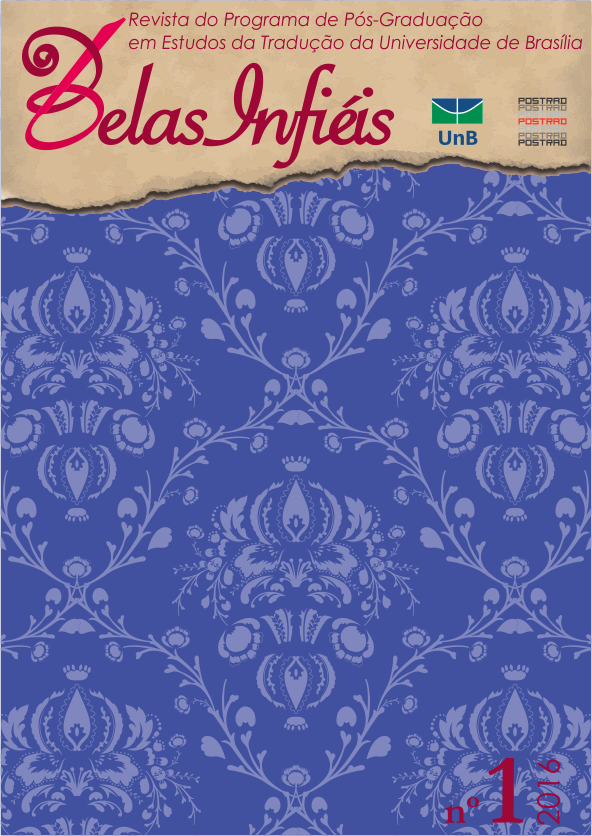AS MEDIAÇÕES LINGUÍSTICAS DO INTÉRPRETE DE LÍNGUA DE SINAIS:
OPORTUNIDADES DE APRENDIZAGEM NA SALA DE AULA INCLUSIVA
DOI :
https://doi.org/10.26512/belasinfieis.v5.n1.2016.11366Mots-clés :
Intérprete de Língua de Sinais, Alunos surdos, Sala inclusivaRésumé
Este artigo se predispõe a analisar as características de uma sala de aula inclusiva de escola regular de ensino médio da rede municipal de Belo Horizonte. O intérprete de Língua de Sinais que atua nessa classe possui lugar central neste estudo. Os outros participantes desta investigação foram os alunos surdos e os alunos ouvintes da classe do professor da disciplina História. O presente estudo apresenta uma reflexão quanto à s escolhas discursivas do intérprete e como repercutem nas expectativas e demandas para participação e envolvimento dos alunos surdos dentro da perspectiva sociointeracional de Cook-Gumperz (2002) e Goffman (2002), e como também reflete com Napier (2006, apud VIEIRA, 2007), Viana (2007), Gonçalves (2005) e Rosa (2008) nos aspectos fundamentados no campo da tradução e da interpretação. Adota-se para o estudo uma investigação de cunho etnográfico apoiado nos propósitos teóricos defendidos por Castanheira (2004), Collins e Green (1992),iii Frank (1999) e Ezpeleta e Rockwell (1989).
Téléchargements
Références
CASTANHEIRA, M.L. Aprendizagem contextualizada: discurso e inclusão na sala de aula. Belo Horizonte: CEALE; Autêntica, 2004.
CASTANHEIRA, M.L; DIXON, C; GREEN, J. L. Práticas de letramento em sala de aula: uma análise de ações letradas como construção social. Revista Portuguesa de Educação,20, 2007. p. 7-38.
COOK-GUMPERZ, J. Convenções de contextualização. In: RIBEIRO, B.T.; GARCEZ, P.(Org.). Sociolinguística Interacional. SP: Editora Loyola, 2002. p. 149-182.
EZPELETA, J.; ROCKWELL, E. Pesquisa Participante. São Paulo: Cortez; Autores Associados, 1989.
FRANK, C. Ethnographic eyes. A teacher is guide to classroom observation. Los Angeles: Heinemann, 1999.
GOLDFELD, M. A criança surda: linguagem e cognição numa abordagem sócio-interacionista. SP: Plexus, 2002.
GONÇALVES, J. L. V. R. O desenvolvimento da competência do tradutor: em busca de parâmetros cognitivos.In: ALVES F.; MAGALHAES, C.; PAGANO, A.; Competência em tradução: cognição e discurso. BH: UFMG, 2005.
GREEN, J. L. A etnografia como uma lógica de investigação. Educação em Revista, v.2, 2005. p. 13-79.
MIRANDA, D. G. A história da educação dos surdos:as práticas educacionais foram determinadas pelos profissionais ou formuladas pelo contexto sócio-político da época. 2007. 74f. Monografia (Pós-graduação em Educação Inclusiva) ”“Escola de Governo da Fundação João Pinheiro, Belo Horizonte, 2007.
PERRENOUD, P.Práticas pedagógicas, profissão docente e formação”“perspectivas sociológicas. Lisboa: Nova Enciclopédia, 1993.
ROSA, A. da S. Entre a visibilidade da tradução da Língua de Sinais e a invisivilidade da tarefa do intérprete. RJ: Editora Arara Azul, 2008.
VIANNA, B. Teoria da Relevância e interpretação simultânea. In: ALVES, F; GONÇALVES, J. L. (Org.). Relevância em tradução: perspectivas teóricas e aplicadas. BH: FALE/UFMG, 2006.
VIEIRA, M.E.M.A auto-representaçãoe atuação dos professores-intérpretes de Línguas de Sinais: afinal... professor ou intérprete. Centro de Ciências da Educação/UFSC, 2007.
Téléchargements
Publié-e
Comment citer
Numéro
Rubrique
Licence
Copyright Statement
Given the public access to this journal, the texts are free to use but requires the recognition of the original authorship and initial publication in this journal to be properly stated.
The journal allows the use of works published for non-commercial purposes, including the right to submit the work to publicly accessible databases. Published contributions are the sole and exclusive responsibility of the author(s).
- When submitting papers to be evaluated by the Belas Infiéis journal, the author(s):
- Declare that the contents of the contributions are original and of their original creation, being entirely responsible for their content if there is an objection by third parties.
- Claim to be aware that they should not commit academic plagiarism.
- Declare that the manuscript has not been published, completely or partially, in Portuguese or another language. If it is a translation it should be submitted to the Translated Articles section.
- Declare that the manuscript is not being evaluated by other journals.
- Declare that the manuscript was not submitted to another journal simultaneously.
- Commit(s) to inform the journal of any kind of error or inaccuracy in their contribution (published, in evaluation or in editing) and to collaborate with the editors to make due corrections of the article (when in evaluation or editing) or erratum/retraction (after publication).
- Declare that there is no conflict of interest regarding the published work.
- Authorize its release if it is accepted for publication without any kind of monetary compensation.
- Agree to assign non-exclusive rights to publication to the magazine, remaining free to make their contribution available in other media as long as the publication of the first version in Belas Infiéis magazine is mentioned. They also authorize Belas Infiéis to assign their texts for reproduction in content indexers, virtual libraries and similar platforms.
- Maintain copyright and grant the journal the right of first publication, the work being licensed under theCreative Commons Attribution License.
- Is/Are allowed and encouraged to publish and distribute their work online after the editorial process, which may increase the impact and citation of the published work.
- Authorize the editorial team to make textual adjustments and to adapt the article to the publication rules, when necessary.



















